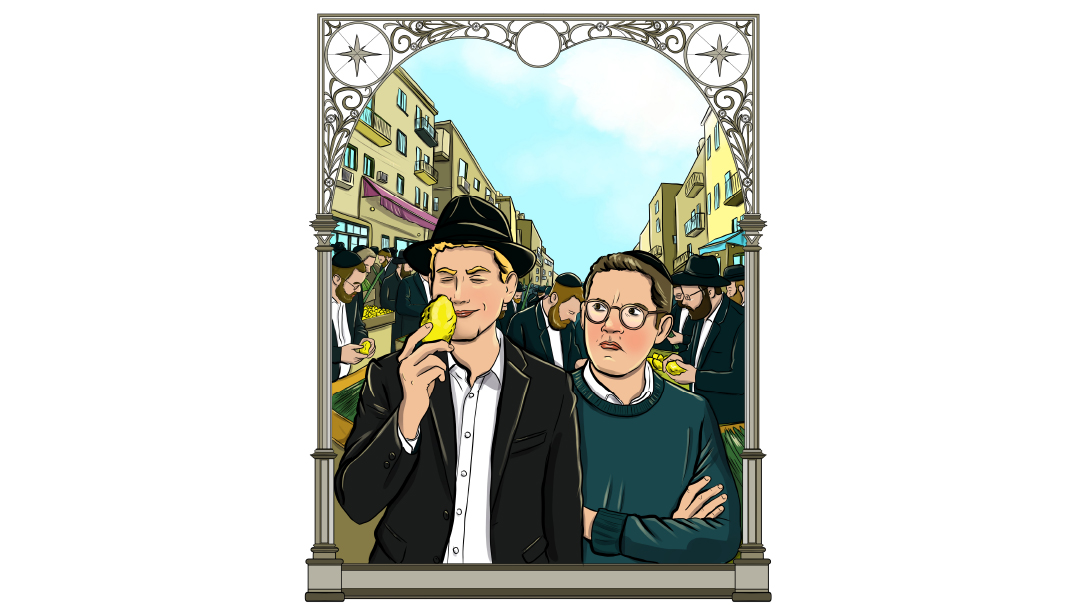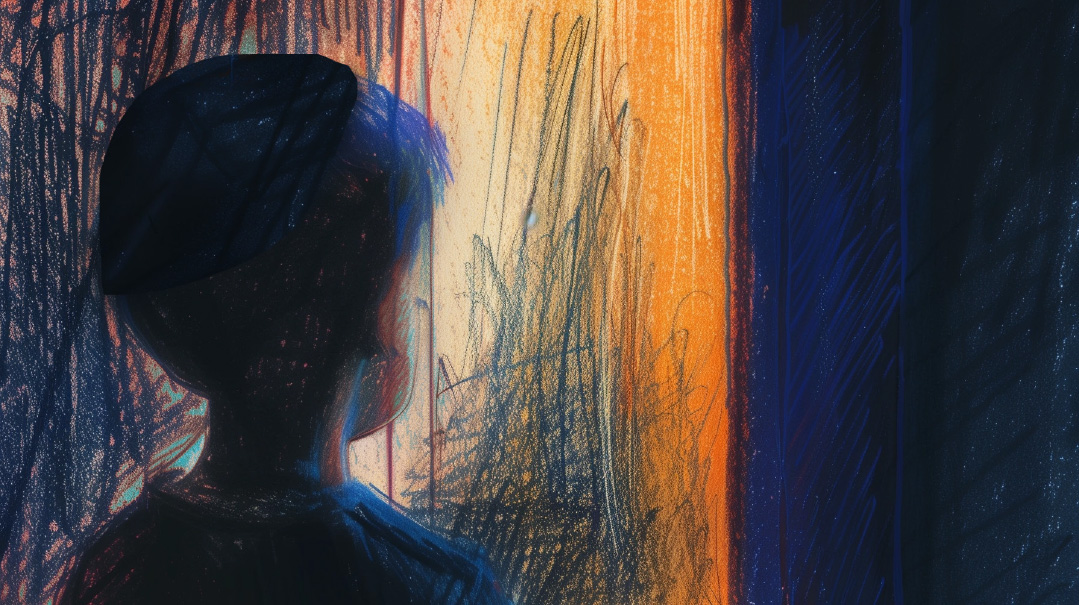Taking It Far

“You hear that music it went to the moon. Why can’t I go far too? I’m talented I love playing it’s the only thing that makes me feel whole. I’ve done my research. There’s a college up north. I’m starting next week”

A nother call from the Center. What has Effy got into this time?
“Hello” Aviva says a sigh embedded in her voice. She tenses goes into steel mode: defender protector knight.
It must be Leora Effy’s key worker…
“Hello it’s Mrs. Wilsen here.”
Oh. Why is the head of the Center calling her? Are they sending Effy home?
Things had gotten off to a rough start this year with last year’s key worker having moved to Israel. Effy doesn’t like Leora she’s a firm one. But really had things spiraled all the way to the top?
“…an event a fundraiser this winter Chanukah time ” Mrs. Wilsen is saying.
What no Effy no problem?
She flops down on the couch.
“An evening of creativity showcasing talent in our community. For the main program we’re going to have three artists compete on stage paint a picture in an hour… We want all the entertainment to be uh home-grown.” Mrs. Wilsen sounds quite pleased with her choice of word.
Aviva leans back into the leather of the couch. “That’s nice.”
Mrs. Wilsen clears her throat “We were wondering if you could play your saxophone?”
“How do you know I play?” she blurts.
Mrs. Wilsen laughs. “Effy told us.”
Kids.
“I’m not sure if I’d call on his word alone though.” She chuckles. “But I heard you played a couple of years back at the Bnos Binah event.”
Had it been two years? The sax was gathering dust in the closet.
She would take it out buff it insert the reed and play play play.
“I’d be happy to ” she says. “What do you have in mind? A certain song a theme…” “Anything ” Mrs. Wilsen says. “It’s an evening of expression of pure talent.”
“Anything?” She repeats the freedom filling her making her itch to play again.
“Anything that’s not a nursery rhyme ” Mrs. Wilsen says.
Anything?
The sun throws columns of light onto the couch through the blinds. She knows she should get up get supper going but the warmth stripes her feet and she stretches back into the couch until it’s reclining. Anything…
Jerusalem 1997
“A boat ride in Akko. That’s where everyone’s going….”
“Who’s everyone?” Rena asks. Already her eyes are blazing challenge.
Oh please it’s the beginning of the day I don’t have energy for existential questions.
“Whoever stayed for Succos. Sari and Leah and Avigail y’know the chevreh. C’mon Rena we missed their bus already. Let’s go it’ll be fun.”
They take the bus up to Haifa. It flies through the dust jostling and bumping. The long journey unkinks something in Rena. She’s talking and talking riding on angst. “And they’re all gonna have so much to say. What’s up with the hairdo Rena? Your earrings are too long too weird…” She mimics their voices with scorn. But Aviva is her friend she can hear the lace of hurt too.
She listens to the spurting volcano with half an ear half a heart. She knows Rena gotta let her vent and she’ll fizzle into calm. She’s like that. At least she thinks she still is. She’s not in the same seminary. Obviously. So maybe she doesn’t know what she’s like these days.
They get off the bus in Haifa and walk through the streets, hot and bothered and dizzy.
“We should’ve stayed on the bus till the port. Now we have to walk…” Aviva realizes.
“Who cares, I told you I’m not looking forward to seeing the crowd.”
Across the street is a grand building, brick faחade, arched doorways, triangular patterned roof. “MadaTech, Israel National Museum of Science, Technology, and Space,” she reads.
“Let’s go inside,” Rena cajoles.
Aviva shrugs. She wants to meet the others. She’s so intense, my childhood friend. Maddening, exasperating, and lovable at once. Rena fixes eyes on her. Black confusion times two.
“Just for a bit,” she says.
A screen near the entrance shows recent TripAdvisor comments: “Albert Einstein would have been proud of MadaTech,” says one. But she’s not in the mood. They walk past a labyrinth of bubble pipes, kids turning the water colors, blowing and popping bubbles inside the glass. They wander listlessly through the exhibits, too much fascination for tired minds to process.
They find themselves at the end of the building, the Space section. Strains of music rise softly from the corner. They drift over.
Music. It’s the only real bridge in their relationship now. Childhood, community, they couldn’t make the stretch. The music stops, surges forth. The tune crashes out of the speakers and bounds off the darkened alcove.
They look at each other.
“Dvorak’s New World Symphony,” they say together.
And they laugh.
“Remember? The ninth grade music recital…” For a moment Rena’s eyes light. “Dvorak transposed from orchestra to motley collection of sax, guitar, piano, clarinet.”
“Mrs. Dubinsky at rehearsals.”
“It was too long ago, Aviva…” She raises her hands and plucks an imaginary guitar in time to the music.
Aviva cups her hands in the air in front of her and blows.
They laugh again. Like old times. Almost.
At the display an astronaut’s uniform stands in a glass case. A video plays the famous footage of Neil Armstrong’s first steps on the moon. Underneath it says, “Dvorak’s New World Symphony, the music that went far. Neil Armstrong took a recording of the New World Symphony to the Moon during the Apollo 11 mission, the first Moon landing, in 1969.”
“Whoa,” Aviva says. “That’s big…”
Rena’s eyes are closed. She opens them and turns on her. “Listen Aviva, Armstrong took the music as far as it could go. I wanted to tell you right before, but I think you’ll understand now. I’m going to take my music as far as I can, too.”
She blinks. “That sounds great.”
Rena jerks her chin. “You don’t get me, I’m dropping out of seminary. I’m going to music school.”
The speakers come to life again, pouring Dvorak’s symphony between them.
“You hear that music, it went to the moon. Why can’t I go far too? I’m talented, I love playing, it’s the only thing that makes me feel whole. I’ve done my research. There’s a college up north. I’m starting next week.”
The volcano’s woken up, and this time it’s not just a stir, it’s lava, hot and thick. And it’s going to burn.
She looks at Rena. Her stance screams defiance, she is set as ever.
A secular music college, playing music with boys, breaking out of the community, has she told her parents…?
Her thoughts spool like ticker tape, she discards them all, and settles on five years back. I wish we were 14 again — she with her guitar, me with my sax — with the others and Mrs. Dubinsky practicing in the classroom…
She shakes her head, slowly.
The New World Symphony rolls and crests around them, beautiful, heart stirring, dangerous.
“Tired.” Effy wants to plunk himself down on the sidewalk.
Physical therapy and its fallouts. He is exhausted, she feels a headache crawling round her eyes.
Effy pulls himself down till he is almost squatting.
“But Effy, darling, everyone is coming home soon, and if you come now you can have some time to play with Mommy first.”
He gives her a melting smile, eyes big and shiny, and she feels a rush a love for this child who demands so much of her energy.
He shuffles himself forward, and she’s almost tempted to hoist him up and hold him. Almost. He’s really too big for that.
Effy stops again on the corner and the headache creeps into her temples. And there, on an Oriental rug laid out on the sidewalk, sits a woman playing the guitar.
Slowly she rises. Her hair spills onto her shoulders, her dress flowing sateen around her. Now gold, now orange. Her fingers fly over the strings of her guitar, so swift, so sure. She’s not just another busker. There’s something about her: precision, movement, consonance.
Effy sits down at the woman’s feet and sways to the music.
Aviva wants to lean against the “No Parking” sign, close her eyes, and drift away. But she cannot tear her eyes off this beautiful, mystical guitarist.
The song winds down. A smattering of applause. A shout: “Encore.”
The musician smiles, reaches for the guitar again, and starts up slow and haunting, just licking the strings. And then there are the first sublime chords of a song Aviva knows well: Dvorak’s New Symphony.
Rena?
Jerusalem, 1997
A knock on the window.
Aviva fumbles for the curtain.
A nose pressed against the glass. Rena.
She slips outside.
“You are crazy,” she tells her when they’re standing in the shade of the whispering trees.
“That’s a nice way of saying goodbye,” Rena says.
“What?”
“Yeah, I told you I was going on Sunday.”
“But, but Shabbos was just out.”
“The bus to the moshav leaves at five.”
“Oh, Rena…”
She turns black eyes on her, defiant eyes, daring Aviva to challenge her.
Aviva is tired, and cold, and small, small against the endless tarpaulin of purple sky, the gnarled branches of the grove, and the girl before her.
She can’t stop her. All she can give her is her friendship. And maybe, just maybe, someday down the line, that will be enough to bring her home....
She squeezes her hand. “I’ll miss you.”
Rena gives her her other hand, squeezing hard, and for a moment she melts, fear and confusion wavering in her eyes.
“We’ll be in touch,” she says. She holds her hands in front of her and mimics Aviva playing the sax. “Through music.”
She leans in for a hug and then she blinks everything out of her eyes. When she leaves, they are black and resolute as night.
Could it be?
She’s playing, pounding the high notes, coaxing life out of the guitar.
Her hair falls over her face. Small face, heart-shaped face. Rena?
No, she looks too young. But her shoulders — she’s been around. She’s not as young as her face tells.
It’s her.
Aviva’s heart pounds. Where has she been? Where has life led her that she is street-busking on the streets of London?
Rena. After all these years.
She will go over. Her heart quails.
The woman slows again, soft, supplicating notes. She looks up from the guitar.
Aviva breathes.
It is not her.
Not her at all.
Effy’s small body sways against her skirt. He looks up. “Love dis, Mommy,” he says.
“And I love you,” she whispers absently, registering somewhere that she is a mother, that maybe they can reach Effy through music, all the while exhaling the intense relationship of two girls on wildly divergent paths.
Aviva thinks about Rena sometimes. Between suppers and endless laundry. And when she steps onto her porch and looks out at the moon. Though she wonders if it’s already sunrise wherever Rena is. Or if she’s too bogged down to look up at the sky.
She even does a quick Google search. Rena Lazar. An artist, an author, 45 LinkedIn professionals, and too many blog posts to bother with. She hasn’t the time to indulge the whim, to go off on a search of identities.
And then the invitation comes in the mail. A VIP card falls out.
You are invited to Dinner, courtesy of The Special Childrens’ Center.
The dinner, the fundraiser for Effy’s school.
She drags over a stool, gropes at the top of her closet for the sax. She holds it reverently and marches into the kitchen. “Ta dah,” she pronounces dramatically to a table full of kids.
“What’s that?” Shuey asks.
But Chava says, “Oh, I remember when you used to play.”
“Really, you were cool once?” That’s Miriam.
“I’m still cool, thank you,” she says, hugging the saxophone close. “And I’ve been asked to play this particular friend at a dinner in Effy’s school.”
“Great going.”
“Not bad!”
“Can I come see you play?” Miriam asks.
“Can I?” Effy says. “S’for my school.”
“It is,” she says, sitting down beside him, still cradling the sax. “But it’s for adults only. You know what, you kids can help me choose a song.”
“You mean you can play, like, anything? We just pick a song and you’ll know how to play it?” Aron asks.
“I think so,” she laughs. “Last time I checked I could play by ear.…”
“ ‘Kamah tov shenifgashnu?’ ”
“ ‘Yodati!’ ”
“ ‘Hooleh!’ ”
“Mommy plays classical stuff, like long, changing songs, the kind that has no words to it, you know, like we hear at the dentist,” Chava says.
“Don’t do that, Mommy. The audience needs to be able to sing along,” Aron declares.
“And anyways, no one does that anymore,” Chava says sagaciously. Her daughter is part of a new world; a proliferation of Jewish songs.
“Yeah, do something normal, Mom, something fun, something leibedig,” Miriam chimes in.
“Okay, okay, you win, but I don’t know, none of those songs work for me somehow.”
“Give me a minute,” Chava says, crinkling her eyes, blocking her ears. “I have it. ‘Mama Rochel.’ Shwekey, from Journeys. It’s so you, Mom, you love it.”
She does. It is pure and beautiful, and the lyrics still make her cry sometimes.
“Hey, maybe, Chava,” she says. “Thanks.”
She puts the saxophone on top of the bookcase and dishes out the next course.
When he comes home, Shaul seconds the motion. “Pretty good for 12,” her husband says.
“ ‘Mama Rochel.’ She got you there.”
She smiles and indulges him in an impromptu practice after supper. She adjusts the strap, moistens the reed, and applies cork grease. When it is all lined up she blows, blows into the instrument. Her fingers dance over the holes, covering, uncovering, making music.
“Mama Rochel, cry for us again…” Shaul trills, getting into it, getting animated, and yes, there is something to what Aron said. We are people of song, but more than that, we are people of words. We need the words to connect us to the melody, to take if further, bring it home.
She salutes, twirling the instrument with a flourish. Feeling young and old and whole.
Leora is seated next to her. She supposes it’s not by chance. Why not use the time to catch up with the key worker, an impromptu PTA. Still, she’s out to dinner and she’s going to be performing. She bothered with maroon heels, a turquoise flat-stone pendant, and a bright smear of lipstick. Her best concessions to color. She doesn’t want to hear about therapy plans and targets and how to get Effy to share.
As they eat, the artists paint. The three of them set out on stage, hard at work over their easels. One sits low, the other stands and hunches in a way that’s bad for her back, and the third has tipped her easel until it is almost horizontal.
We all have our ways. Even in the things we’re similar at. Aviva savors the fish course and watches. Bright colors, bold strokes, brushes and sponges and fingers.
An oversized stop watch shows 33 minutes and 17 seconds left.
A picture in an hour. Cool.
Her fish plate is deftly collected off the table. Soup, creamy onion, takes its place. She looks up — and into —
It cannot be. Why does she see her everywhere?
I’m going to track her down, Hashem, I will this time, but please, please, I’m possessed, or hallucinating.
Black hair, coal-black eyes.
It’s not her. Why would it be?
The eyes flicker. “Aviva?”
She shakes her head, holds it a second. Looks into the eyes.
“Rena?”
“Re,” says the waitress, perching down beside her.
And the first thing she can ask her friend after 13 years is, “Why Re?”
The ghost of a grin on her face. “For the music note, do re mi…”
Aviva smiles. “You would.”
“You came with your sax,” Rena says.
She fondles the case. “Yeah, surprise, I’m going to play tonight. It’s on the program.”
“Oh, I don’t check the program.”
Right. She is part of the waitressing team. Why? For heaven’s sake, why? What happened with the music school?
In her mind Rena was playing at the concert halls of Italy, singing soprano at the opera houses. Or maybe flowing fingers, flowing dress on the high street.
She should be glad to see her like this, to learn that her friend isn’t contravening her faith everyday. But Rena a waitress? That’s like clipping the wings of an eagle.
“So you still have the Keilwerth? The ST90 was it, no?” Rena asks.
“On the mark,” she says.
And then they are just sitting, rather too stiffly, a rushing gulf between them.
Twenty-seven minutes, thirty-nine seconds, says the stopwatch.
Rena looks around at the tables. She’s working. But the bowls of soups are still steaming curls into the air. Woman chatter, clinking spoons, exclaiming over the artwork out front. She sees Leora chatting with Mrs. Wilsen. No one notices an odd pair on the back table.
Where to start? Where to go? Where not to?
“You always were diplomatic…” Rena muses.
“What?”
“Yes, you don’t want to ask why I came to this.”
Arrow straight, as ever.
Aviva inclines her head. “If you want to talk about it.”
Rena gives a laugh, mirthless. “Do I want to? It’s here, in my life. It’s eaten up chunks of it, and this, this is good. I’m only just starting to live again…” She waves a weary hand. “Where did we leave off?”
“At night, under a tree,” Aviva whispers.
“Ah, yeah, so I went up to the music school, and the competition, the pressure, it was killing me. So I turned to things, y’know, substances. I was out for a long time. I couldn’t tell you what I did those years, drifting, playing, crashing, but I wanted it all to end so badly. And there was no way back.”
Aviva gives her a stricken look.
“No, there wasn’t,” she reiterates, her voice hard. “Who would want me back like that? What do you people know of having to do things you know will kill you… Of it all?”
Aviva winces, says nothing.
“This,” Rena fingers the pocket of her apron, “this is the good me.” And so quiet, that Aviva strains to hear her, “It’s part of my rehab to normal life.”
Oh. Oh. So this is where she’s holding.
Abruptly, Rena turns on her and asks, “And you?”
She’s trying to formulate a response, grasping onto the strands of her life, to pick one, hold it up to Rena’s anguished scrutiny.
“So you’re married, obviously?” Rena asks.
She nods.
“Kids?”
She nods again.
“House?”
She nods apologetically.
But why, because her life sounds charmed in three questions? Because she has everything that Rena doesn’t?
Rena isn’t done. “How many?”
She vacillates. “Six,” she says finally.
“Six kids who depend on you, confide in you, and look up to you. And I can barely take care of myself….”
Rena talks trance-like, as if to herself. And then she murmurs, “I suppose you think it’s ’cuz you’re frum, ’cuz you deserve it all. I left, so I have this,” she crumples her apron again, “this coming to me.”
She shakes her head, hard. “No, it’s not like that, not at all. You know it doesn’t work like that. We each have our journeys….”
Don’t come off as spiritual now. What wouldn’t she do to choose yours? Show her you’re struggling, too.
The words trip out of her mouth. “Effy, my second youngest, he’s… he has severe developmental delays, and that’s why I’m here tonight, really. This dinner is in aid of his school, his special school.”
She can see the cogs turning, What’s one child out of six when my whole life is in shambles?
Show her you’re fallible, human, like her.
“And, and I’ve made my own mistakes too.” Her words are like bumbling feet. “Ugly ones. Still living the effects.”
Is that the way? To show her the underside. What about the beauty in a dark sky, the silver linings, the love of life they once shared?
A tap on Rena’s shoulder. Another waitress asks brusquely, “Where d’you think you are?”
Rena startles to her feet.
“Stay,” Aviva says, a desperate clenching in her chest.
“I have a job,” Rena says primly. “But I’ll stay to hear you play.”
Aviva stares at her cold soup. Stares at the main course, picks at it. Hears the stopwatch go off, the audience gesticulating wildly, a clamor of voices. She is islanded from their excitement; they care about a winner. Her friend has surfaced from the seas, charred and pained… and she can only sit and mutter one loaded sentence after the other.
What’s with her?
And then Mrs. Wilsen is gesturing to her and Aviva swings onto her heels, holding onto the sax for dear life.
As she walks towards the stage, she feels the women’s eyes on her, and she struggles to clear her mind. She will give herself to the music. And it will soothe her spirit. And then what?
“Introducing Mrs. Aviva Levi, a mother of one of students, our very own saxophonist.”
She smiles automatically, vaguely noting the sparks on her top, her pendant green incandescent under the spotlight.
Mama Rochel, here we go, she thinks, and she lifts the brass instrument.
She looks once out at the women, and just before she looks back and blows, she sees a pair of dark eyes watching intently from the fire exit.
And then she is blowing, her fingers tapping out a tune from the past. She is 14 again, and the melody comes to her effortlessly, a forgotten friend, coming to life, note by note. She is 18, listening to the music that went to the moon, and taking it as far as she can tonight.
Yes, we are people of words, she thinks, but sometimes there are no words, and you are reaching for the soul, through crashing highs, and lilting lows, like the straining and merging of hearts.
And somewhere at the edge of the hall, a woman listens to Dvorak’s New Symphony and her eyes drop crystal tears.
(Originally featured in Family First Issue 567)
Oops! We could not locate your form.







